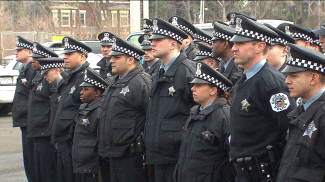by Araz Hachadourian
May 17, 2015
NOTICE: THIS WORK MAY BE PROTECTED BY COPYRIGHT
YOU ARE REQUIRED TO READ THE COPYRIGHT NOTICE AT THIS LINK BEFORE YOU READ THE FOLLOWING WORK, THAT IS AVAILABLE SOLELY FOR PRIVATE STUDY, SCHOLARSHIP OR RESEARCH PURSUANT TO 17 U.S.C. SECTION 107 AND 108. IN THE EVENT THAT THE LIBRARY DETERMINES THAT UNLAWFUL COPYING OF THIS WORK HAS OCCURRED, THE LIBRARY HAS THE RIGHT TO BLOCK THE I.P. ADDRESS AT WHICH THE UNLAWFUL COPYING APPEARED TO HAVE OCCURRED. THANK YOU FOR RESPECTING THE RIGHTS OF COPYRIGHT OWNERS.

For nearly 20 years, officers of the Chicago Police Department tortured more than 100 people. How survivors and their lawyers won a decades-long fight.
In 2005 Standish Willis, a lawyer from Chicago, was home with a broken ankle. He was working on the case of a man who claimed that, years ago, he had been tortured by police. On the radio in the background, President George Bush argued that the U.S. military’s actions in Abu Ghraib did not constitute torture. That’s when Willis had an idea: “We could make the torture case international, and embarrass the United States.”
On May 6, after decades of lobbying, international intervention, and grassroots organizing, Chicago became the first U.S. city to offer reparations to victims of police violence. From 1972-1991 more than 110 mostly African American men were tortured into confessions by Jon Burge, a police lieutenant, and his subordinates.
Last week’s success comes 21 years after Burge was fired for his misconduct.
“The city had lived so comfortably with the torture for so long that I thought not much could disturb that,” said John Conroy, a former reporter who first covered police torture in Chicago 25 years ago.
Conroy heard about the movement to bring reparations in 2010, but didn’t think it would be successful. “I think it can be safely said that millions of people in this city have known for at least 22 years that the torture occurred,” he said. “But there has never been a palpable atmosphere of outrage.”
Chicago’s city council unanimously approved an ordinance granting $5.5 million to the victims of torture, in addition to social and psychological services. The money will be divided evenly among the victims, with a cap of $100,000 per person. Any previous settlements will be deducted from their share.
According to The Chicago Reporter, the city has already spent $64 million in civil settlements for torture cases that occurred during Burge’s tenure. But the ordinance provides more than just money: It includes a formal apology and recognizes the torture of Chicago residents as a violation of international human rights law.
It also mandates the creation of a center for torture survivors and their families; a public memorial to the victims; psychological counseling; free enrollment in City College for the victims, their children, and grandchildren; prioritized access to health and social services; and the inclusion of Burge and the torture incidents in the 8th- and 10th-grade curricula of Chicago public schools.
Burge was suspended from the police force in 1991 and subsequently fired in 1993. The acts gained even more publicity in 2003 when Governor George Ryan pardoned or gave clemency to all of the death row inmates convicted under Burge.
So far, the city has paid settlements to some survivors. But Burge and the officers who worked with him remained free despite the efforts of the victims’ lawyers to have them prosecuted as human rights offenders. According to Willis, the State’s Attorney, Assistant U.S. Attorney, and Justice Department were approached, but would not prosecute the officers involved.
“We tried a little bit of everything,” Willis said. “And they wouldn’t do it. They simply would not do it until we went international.”
America’s “Torture Capital of the World”
In 2008, when Chicago was bidding to host the 2016 Summer Olympics, Willis brought former Olympian runner John Carlos to the city. They called Chicago the “Torture Capital of the World,” and said it was unworthy of hosting the games.
In 2006, Joey Mogul, a lawyer for People’s Law Office, which helped draft the ordinance and defend the victims, presented the case to the UN Committee Against Torture in Geneva. The UN then called on the U.S. government to investigate the torture cases further.
This led to Burge’s arrest in 2008. He was charged with obstruction of justice and perjury, but only convicted of latter (the statute of limitations prevented him from being charged with torture). Burge served four years in prison. He is now retired in Florida and still receives a pension.
The ordinance for reparations was first submitted to the city council in October 2013. It was set for hearing a few months later, but the event was canceled due to a “lack of political will,” according to Mogul.
In 2014, the case was presented again to the United Nations Committee Against Torture, which came out in support of the ordinance. Amnesty International, We Charge Genocide, and Project NIA also supported reparations. They helped organize Twitter power-hours, sing-ins at city council meetings, postcard campaigns, petitions, and marches to get the city’s attention.
It is important these cases be recognized as torture and a violation of international human rights law, said Mogul. “It recognizes that torture did in fact occur in the city, on our own South Side, to black people—and that is profound.”
This is important for a city where police brutality is still very much a current reality. Just last year, a police commander was indicted for shoving his gun down a man’s throat. Two years before that, Rekia Boyd was shot and killed by an officer.
